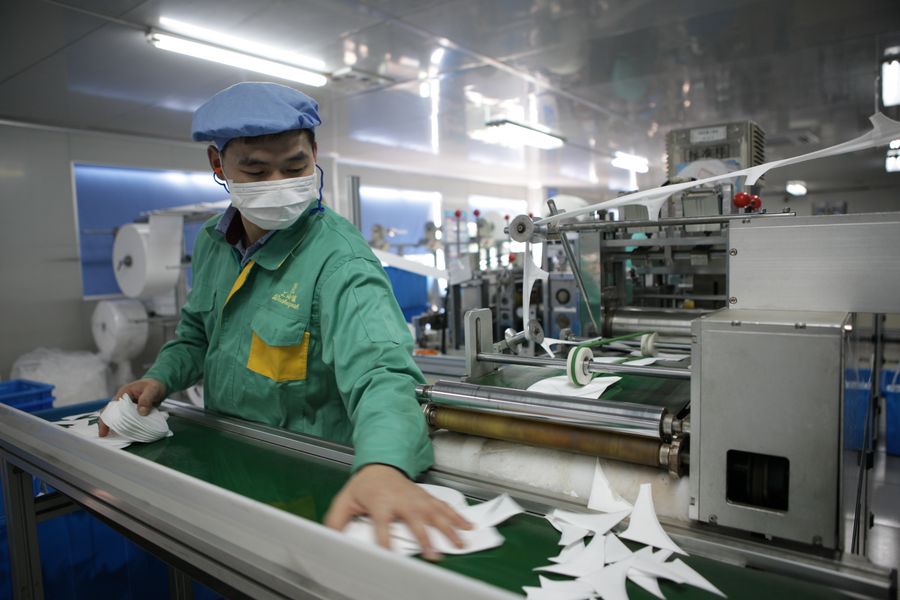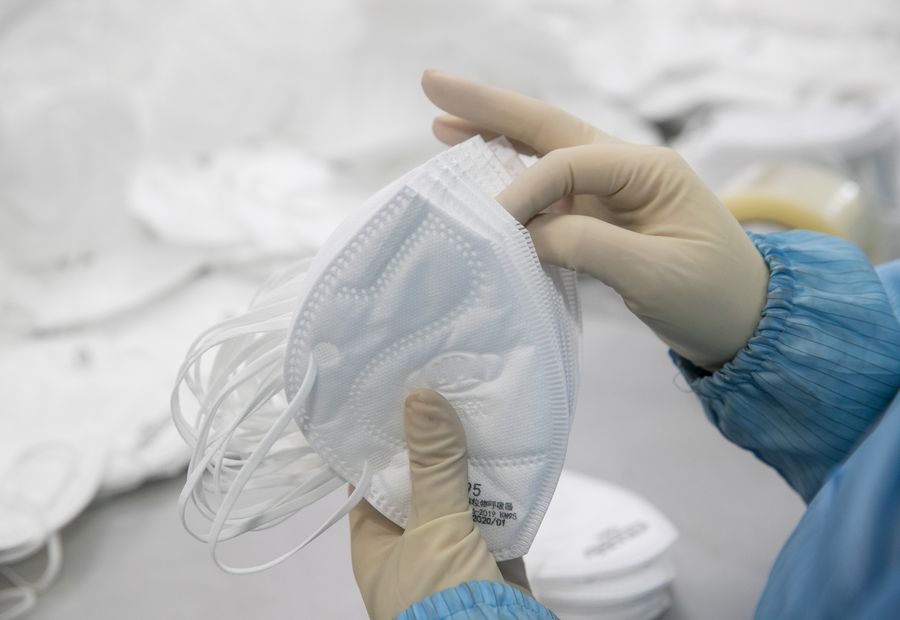China has been endeavoring to ensure medical supplies and daily necessities as it battles the novel coronavirus epidemic. Medical manufacturers have taken immediate actions to ramp up production to meet increasing demand.
With concerted efforts, the supply of daily necessities in Wuhan and the whole of Hubei Province as well as other places in China are also being secured.
SHANGHAI/JINAN, Feb. 3 (Xinhua) -- China is making every effort to ensure the supply of medical and daily necessities for citizens as the country battles the novel coronavirus epidemic.
The novel coronavirus epidemic has triggered a sharp increase in demand for masks for citizens and protective clothing for medical workers. Companies have been mobilized to run at full capacity to produce these high-demand materials.
PRODUCTION AT FULL CAPACITY
Since the novel coronavirus outbreak, residents have rushed to buy masks. However, shelves in physical stores are empty, and it is becoming increasingly difficult to buy masks online. Hospitals in the hardest-hit city of Wuhan in central China's Hubei Province are also in urgent need of medical materials.
Medical material manufacturers have resumed production despite the shutdown period of the Spring Festival holiday to cope with the problem.

A worker makes masks at Shanghai Dasheng Health Products Manufacturing Co., Ltd. in Shanghai, east China, on Jan. 31, 2020. (Xinhua/Wang Xiang)
In the city of Zaozhuang, east China's Shandong Province, over 300 workers from Kangli Medical volunteered to work during the holiday.
"Orders have soared in the past two weeks, and we have ensured that our machines will run 24 hours a day," said Lyv Zuopin, the company's deputy general manager.
The Ministry of Industry and Information Technology (MIIT) decided on Jan. 29 to send special representatives to 15 companies that produce medical protective clothing.
Kangli Medical, listed among the selected companies, can make a total of 1,200 protective clothing items a day. With the help of ministry officials, the company has been urgently allocating raw materials and purchasing equipment to expand production scale.
Given the unexpectedly high demand, the mask and medical device manufacturers in Shanghai have also managed to resume and ramp up production.

Workers count masks at Shanghai Yuanqin Purification Technology Co., Ltd. in Shanghai, east China, on Jan. 26, 2020. (Xinhua/Ding Ting)
Shanghai Yuanqin Purification Technology Company, a protective mask manufacturer for Honeywell, has been in full production with 40,000 to 45,000 masks being made every day since last week.
Liao Huolin, the company's president, said the factory had planned to suspend work on Jan. 17, but it urgently recalled its employees who had returned to their hometowns and also invited nearby villagers to assist in production after the novel coronavirus outbreak.
Shanghai has recovered its mask production capacity with a daily output of over 1 million masks, the Shanghai municipal government said last week.
According to the Shanghai Municipal Commission of Commerce, a total of 17 mask manufacturers in Shanghai are gradually resuming their production, and the daily production capacity can reach 4 million after the companies reach a full production scale.
SUPPLIES SUSTAINED
Detection reagents are also in urgent demand. The reagent manufacturers have also joined the coronavirus fight.
Shanghai BioGerm Medical Biotechnology Co., Ltd. is one of the novel coronavirus detection reagent manufacturers approved by the Chinese Center for Disease Control and Prevention.
Most of the company's employees canceled their trips home for the holiday and returned to their posts.
"It's not about the money. We are honored to work for our country at this moment," said Zhou Yan, the company's director of operations.
With the high demand for detection reagents, employees from the sales department even took high-speed trains and planes to deliver goods in person to make sure the reagents could be delivered as soon as possible.

A worker counts masks at Shanghai Yuanqin Purification Technology Co., Ltd. in Shanghai, east China, on Jan. 26, 2020. (Xinhua/Ding Ting)
The preventive traffic restrictions taken by the authorities to curb the spread of the novel coronavirus have to some extent affected transportation of supplies entering the coronavirus-stricken area.
The government, however, has pledged efforts to sustain the continuous supply of necessities to coronavirus-stricken areas, with the National Development and Reform Commission arranging daily transport of vegetables, cooking oil, rice and flour to Wuhan.
Alibaba's Cainiao Logistics has also coordinated with courier firms to deliver 300,000 medical supply items to Wuhan from Beijing, Inner Mongolia Autonomous Region and other provincial-level regions such as Gansu, Sichuan, Hunan, Liaoning and Hainan. The medical supplies include the urgently-needed surgical masks, isolation gowns, protective gowns and goggles.
SUPPLY OF DAILY NECESSITIES SECURED
Farmers in the city of Shouguang, Shandong Province, China's major vegetable production base, are also making a contribution by providing vegetables for Wuhan.

A farmer clears up vegetables at an agricultural products logistics park in Shouguang, east China's Shandong Province, Feb. 1, 2020. (Xinhua/Guo Xulei)
Sang Xuemei, a farmer in Sangjiazhuang Village, got up at about 3:00 a.m., put on a headlamp and walked into the field.
"Every family has bought headlamps to pick vegetables in the dark," she said. "We used to pick vegetables in the afternoon, but we changed the schedule to deliver the freshest vegetables to Wuhan."
Two hours later, she sent 250 kg of freshly-picked cucumbers to the agricultural product examination center at the village's cooperative where cooperative members were busy loading the vegetables onto trucks heading for Wuhan after they were examined.
"China is battling against the epidemic, and we as farmers should make sure that people can eat vegetables as normal," she added.
On Jan. 28, Shandong donated 350 tonnes of vegetables to Wuhan and has been providing 600 tonnes of vegetables to Wuhan at par price daily since then.
The winter season, Spring Festival holiday and preventive transport restrictions in different areas put in place to contain the epidemic affected logistics and resulted in price hikes of some commodities. However, market authorities have worked to crack down on abnormal price hikes by dealers who took advantage of the epidemic situation.
With concerted efforts, the supply of daily necessities in Wuhan and the whole of Hubei Province as well as other places in China has been secured, said Lian Weiliang, deputy head of the National Development and Reform Commission, at a press conference in Beijing, on Monday.
Some problems, such as less varieties of leafy vegetables and delayed replenishment due to logistics, still exist and efforts are underway to solve these shortcomings, Lian said.

A staff member arranges fruits at a supermarket in Qingshanhu District of Nanchang, east China's Jiangxi Province, Jan. 30, 2020. (Xinhua/Hu Chenhuan)
Liu Liansen, a resident in the city of Nanchang, east China's Jiangxi Province, wore a mask and shopped at a local supermarket on Sunday. He bought some green onions, garlic, pork ribs and Chinese cabbage.
"Several days ago, I was worried that there would not be enough supplies of daily necessities, so I rushed to the supermarket. But I was assured when I found that there are ample supplies of rice, cooking oil, vegetables and meat," he said.
(Video reporters: Wu Feizuo, Li Ziheng, Wu Xia, Sun Qing, Guo Jingdan, Pan Xu. Video editor: Liu Yuting)■



